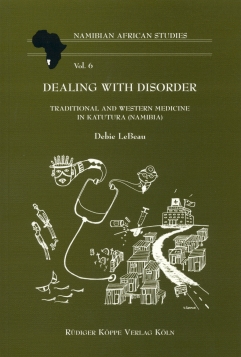


The present study points out the traditional and western Public Health in the Namibian township Katutura near Windhoek. Because of its multiculturality and the disposability of both western and of diverse traditional methods of treatment, the author has the possibility to carry out comparative investigations.
Based on her dissertation (2000, PhD thesis, Rhodes University, Grahamstown / Republic of South Africa) and the corresponding field studies, Debie LeBeau works out qualitative and quantitative sources in her work. Apart from western medical scientists and traditional healers also several patients acted as her informants which reported their experiences with both health systems.
The book contains a detailed description of the socio-cultural background of Katutura and Namibia and examines thoroughly both the behaviour of the patient against the two possible health systems and the social and spiritual background of the deseases.
In the extensive appendices the methods of research are described, seven traditional healers are introduced, an interview with inhabitants of Katutura is documented and case studies about the application of traditional medicine are presented.
Under these links you will find further studies of traditional beliefs and healing practices in Africa and Asia:
Catherine Collett in African Studies Review, 47/3, 2004, 201-202
Der Autorin gelingt es, in mehrperspektivischer Weise (Funktions-) Störungen (disorders) in den Blickpunkt zu rücken, ohne gleichzeitig eine bewertende Unterteilung in krank versus gesund zu machen. Darin liegt die Stärke des Buches.
[Vollständiger Text / Complete review:]
http://www.afrikanistik-online.de/archiv/2005/170
Susanne von Daniels in Afrikanistik-online, www.afrikanistik-online.de/archiv/2005/170, 1-5
Diana Gibson in Medische Antropologie, 20/1, 2008, 184-185
© 2026 by Rüdiger Köppe Verlag – www.koeppe.de